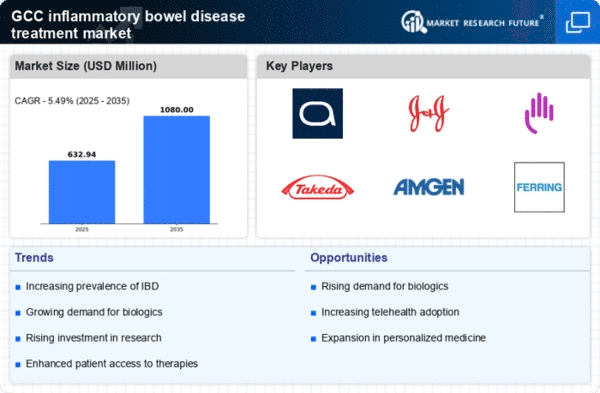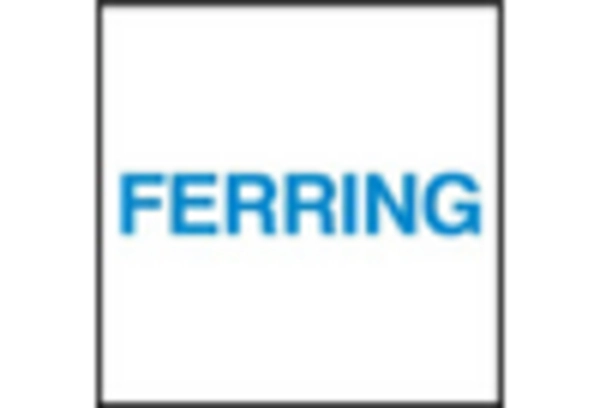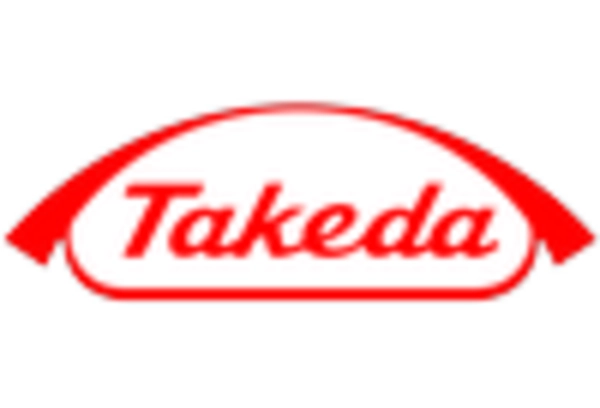Growing Patient Population
The expanding patient population suffering from inflammatory bowel disease in the GCC is a critical factor influencing the inflammatory bowel-disease-treatment market. Demographic changes, including urbanization and lifestyle shifts, have contributed to an increase in IBD cases. Current estimates suggest that the prevalence of IBD in the GCC may rise by 20% over the next decade, necessitating a corresponding increase in treatment options. This growing patient base is likely to drive demand for a variety of therapies, including conventional medications and newer biologics. Additionally, as more individuals are diagnosed, there is a heightened need for comprehensive care strategies that encompass not only medication but also lifestyle management and support services. The market is expected to adapt to these changing dynamics by offering a broader range of treatment modalities to meet the needs of this expanding population.
Rising Healthcare Expenditure
The increasing healthcare expenditure in the GCC region is a significant driver for the inflammatory bowel-disease-treatment market. Governments and private sectors are investing heavily in healthcare infrastructure, which includes the development of specialized facilities for chronic diseases like IBD. Reports indicate that healthcare spending in the GCC is expected to reach $104 billion by 2025, reflecting a commitment to improving healthcare services. This financial support facilitates access to advanced treatment options and encourages research and development in the field of IBD. As healthcare systems evolve, patients are likely to benefit from improved access to medications, diagnostic tools, and specialized care, thereby driving the demand for treatments in the inflammatory bowel-disease-treatment market. The focus on enhancing healthcare services is expected to create a more favorable environment for both patients and healthcare providers.
Increasing Awareness and Diagnosis
The rising awareness of inflammatory bowel disease (IBD) among healthcare professionals and the general public is a crucial driver for the inflammatory bowel-disease-treatment market. Enhanced education initiatives and campaigns have led to earlier diagnosis and treatment, which is vital for managing the disease effectively. In the GCC region, the prevalence of IBD has been increasing, with estimates suggesting that around 1 in 200 individuals may be affected. This growing recognition of IBD symptoms encourages patients to seek medical advice sooner, thereby increasing the demand for treatment options. As a result, healthcare providers are more likely to invest in advanced therapies and medications, further propelling the market's growth. The emphasis on early intervention is likely to lead to improved patient outcomes and a more robust treatment landscape in the region.
Technological Innovations in Treatment
Technological advancements in the development of therapies for inflammatory bowel disease are significantly influencing the inflammatory bowel-disease-treatment market. Innovations such as biologics and biosimilars have transformed treatment protocols, offering more effective and targeted options for patients. In the GCC, the market for biologics is projected to grow at a CAGR of approximately 10% over the next few years, driven by the increasing adoption of these therapies. Furthermore, the introduction of personalized medicine, which tailors treatment based on individual patient profiles, is expected to enhance therapeutic efficacy. These technological innovations not only improve patient outcomes but also attract investment from pharmaceutical companies looking to capitalize on the growing demand for advanced treatment options. As a result, the market is likely to witness a surge in new product launches and clinical trials aimed at addressing unmet medical needs.
Regulatory Support for Innovative Therapies
Regulatory bodies in the GCC are increasingly supportive of innovative therapies for inflammatory bowel disease, which serves as a significant driver for the inflammatory bowel-disease-treatment market. Streamlined approval processes and incentives for research and development are encouraging pharmaceutical companies to invest in new treatment options. Recent initiatives have aimed to reduce the time required for clinical trials and expedite the approval of novel therapies, thereby enhancing patient access to cutting-edge treatments. This regulatory environment is likely to foster a competitive landscape, with multiple companies vying to introduce their products to the market. As a result, patients may benefit from a wider array of treatment choices, ultimately improving health outcomes. The proactive stance of regulatory agencies is expected to play a pivotal role in shaping the future of the inflammatory bowel-disease-treatment market.
















